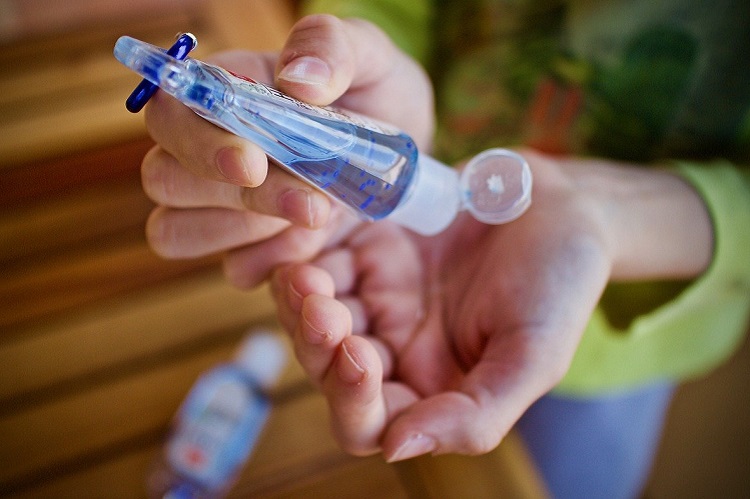16 March 2021
Even though COVID-19 vaccines are being rolled out, it is still important to try to reduce the spread of infection in the home. During restrictions, infections are most likely to be transmitted in households. Research has shown people who follow the advice from the Germ Defence website are less likely to catch flu or other viruses and less likely to pass it on to members of their household.

Germ Defence [freely available from www.germdefence.org/] is the only web-based advice in the world that has been scientifically proven to work against respiratory infections. In a Lancet study of over 20,000 people, using Germ Defence reduced the spread of swine flu and seasonal flu in the home.
Germ Defence has been updated for COVID-19 by a team of health researchers at Bristol, Southampton and Bath universities. The website provides simple, tailored advice appropriate to people’s different circumstances, to help people to use easy behaviour change techniques to reduce virus spread at home.
This covers a variety of topics, such as the importance of opening windows to keep rooms well-ventilated, as well as reminders about cleaning surfaces and quarantining delivery packages. It has recently been updated with advice on keeping safe while attending vaccination appointments.
Researchers from the Centre for Academic Primary Care (CAPC), the National Institute for Health Research Applied Research Collaboration West (NIHR ARC West),and NIHR Health Protection Research Unit in Behavioural Science and Evaluation at University of Bristol are examining if Germ Defence is effective at reducing infections during the pandemic when rolled out through GP practices.
To investigate this, the researchers randomly selected half of all GP practices in England and asked them to tell their patients about Germ Defence in November, and the other half in March.
The researchers designed the trial using new, efficient methods, so that it could be rolled out quickly during the pandemic. GP practices were asked just to tell their patients about Germ Defence, for example via text or email.
To reduce the burden on GP practices, they did not have to send the research team any data. Instead, practices were given individualised Germ Defence weblinks in November and these were used to track website usage in each practice to measure roll out.
Anonymous website analytics are being used to measure how many people used Germ Defence. National routinely collected patient data will be used to examine whether practices who sent out Germ Defence earlier reported fewer infections among their patients.
Chris Whitty, the Chief Medical Officer (CMO) for England, made this a national priority project and the NIHR Clinical Research Network (CRN) adopted it as an urgent public health COVID-19 portfolio study.
Professor Lucy Yardley, who led the development of Germ Defence and is Theme Lead for the NIHR Health Protection Research Unit in Behavioural Science and Evaluation at and NIHR Applied Research Collaboration West (NIHR ARC West) at the University of Bristol, said: “Many people don’t realise that there are simple things they can do that will really reduce the risk of virus in the home. Germ Defence can help everyone and includes advice on what to do if someone in the household may be infected.”
Dr Jeremy Horwood, who is leading the national rollout, and theme lead for NIHR Health Protection Research Unit in Behavioural Science and Evaluation at the University of Bristol, added: “The previous trial published in the Lancet showed that people who used Germ Defence advice got fewer and less severe infections, as did the people they lived with. The updated COVID-19 version of Germ Defence helps people understand what measures to take in the home and how to adopt better home hygiene habits to avoid infection.
“The NHS has been under immense strain during the pandemic, including GP practices, so conducting a large trial has been challenging. GP practices haven’t had much spare time for research. So we’ve tried to design a trial that requires minimal work from practices, so more can take part. We hope this efficient trial design will be valuable for rolling out other interventions.”
About the NIHR Health Protection Research Unit [HPRU] in Behavioural Science and Evaluation at the University of Bristol
The NIHR HPRU in Behavioural Science and Evaluation at University of Bristol is one of 14 HPRUs across England, part of a £58.7 million investment by the NIHR to protect the health of the nation.
The NIHR HPRU in Behavioural Science and Evaluation is a partnership between Public Health England and University of Bristol, in collaboration with MRC Biostatistics Research Unit at the University of Cambridge and University of the West of England.
Each NIHR HPRU undertakes high quality research that is used by PHE to keep the public safe from current and emerging public health threats.
About the NIHR
The National Institute for Health Research (NIHR) is the nation’s largest funder of health and care research. The NIHR:
- funds, supports and delivers high quality research that benefits the NHS, public health and social care
- engages and involves patients, carers and the public in order to improve the reach, quality and impact of research
- attracts, trains and supports the best researchers to tackle the complex health and care challenges of the future
- invests in world-class infrastructure and a skilled delivery workforce to translate discoveries into improved treatments and services
- partners with other public funders, charities and industry to maximise the value of research to patients and the economy.
The NIHR was established in 2006 to improve the health and wealth of the nation through research, and is funded by the Department of Health and Social Care. In addition to its national role, the NIHR supports applied health research for the direct and primary benefit of people in low- and middle-income countries, using UK aid from the UK government.